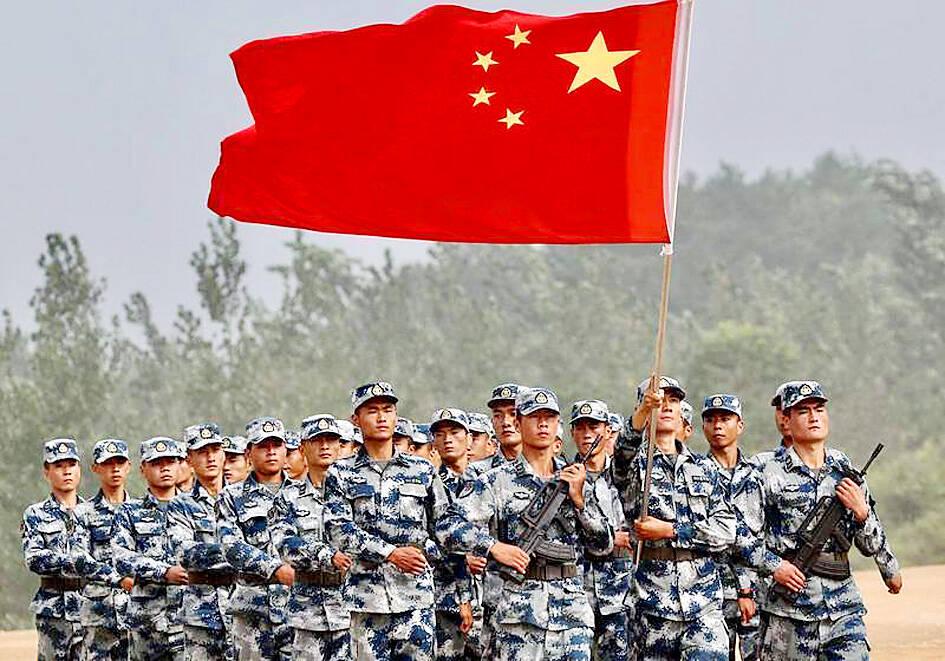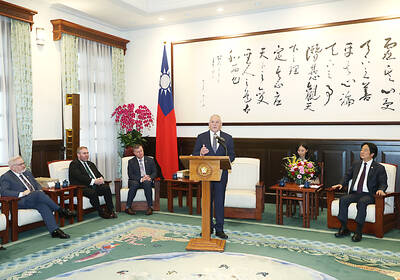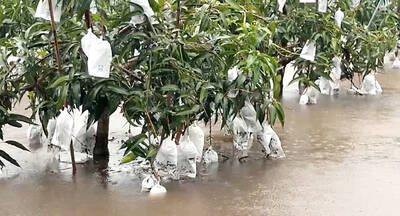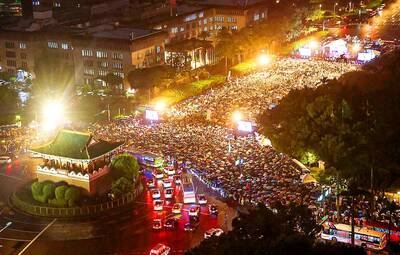There is “a lack of comprehensive understanding and preparedness among EU and NATO officials” regarding a potential East Asian contingency involving Taiwan, a Czech Republic-based think tank has said.
The European Values Center for Security Policy has released a 33-page war game report titled “EU and NATO Decision-Making During a Potential Joint Russian and Chinese Strategic Escalation.”
The Czech Republic-based think tank analyzed possible scenarios and gave 10 policy recommendations to the EU and NATO in the event of a dual contingency scenario.

Photo: Reuters
Recommendations included preparing for a maximum-pressure campaign against China, building real-time communication channels with Taiwan, enhancing joint responses with Indo-Pacific partners and better understanding China’s strategic interests and priorities.
The report concluded that the EU and NATO must continue to address knowledge gaps, particularly in early crisis response, through preapproved operational planning and by improving overall resilience and response capabilities.
The war game simulation further exposed the EU’s unpreparedness, showing slow response, overreliance on rhetoric and lack of early military and economic moves compared with its US and Indo-Pacific counterparts, the report said.
The report was based on a closed-door tabletop exercise conducted in Brussels on April 24 and 25 in collaboration with the Friedrich Naumann Foundation, based in Germany.
The exercise, set in the fourth quarter of this year, simulated gray zone scenarios involving Chinese operations against Taiwan and EU and NATO countries, including the potential for a “two-theater conflict” in the Asia-Pacific and Europe due to increased alignment between China, Russia and North Korea.
The report concluded that the “EU needs strategic plans for mounting a maximum-pressure campaign on the PRC [People's Republic of China] to stop its escalation and/or to force it to pressure Russia into military de-escalation against NATO’s Eastern Flank.”
It further recommended that every EU and NATO country perform a “strategic assessment of its vulnerabilities to China.”
Moreover, NATO must “deeply understand Chinese national interests and priorities,” so as to persuade Beijing to de-escalate from a Taiwan invasion or support of Russia’s continued aggression in Europe, it said.
The report recommended that NATO prepare accordingly for the US to “redirect most of its resources and assets towards East Asia,” which would leave European allies to secure Europe and the Middle East, including key shipping routes such as the Suez Canal.
“The EU and NATO need practical, live communication channels with Taiwan to understand how Taiwan would likely react during different crisis phases,” the report said.
They would also need to discuss crisis plans and monitor reactions from Taiwan’s like-minded neighbors such as Australia, Japan, Philippines and South Korea, it added.
Chinese aggression toward Taiwan would not only affect global allies, but supply chain security and the security of European citizens in Taiwan, the report said.
As for supply chain vulnerabilities, the report recommended that the EU and NATO perform a stockpiling review to ensure at least six months of economic and social stability.
During the tabletop simulation, when faced with a crisis, Taiwan downsized semiconductor exports to Europe to establish contact with European states, the report said.
The EU must also prepare for an energy crisis caused by naval conflicts or blockades of major shipping routes in the Middle East.
However, the report did admit to a gap in information as to how Western citizens would be evacuated from Taiwan.
The report posited that once China had positioned itself to enact a naval blockade of Taiwan, Chinese ambassadors in every European NATO capital could inform their host governments that, unless they take hostile actions against China, China would “allow the safe evacuation of their citizens from Taiwan.”
China might open a “humanitarian corridor from Taiwan to Chinese ports, where vessels carrying European citizens can safely evacuate ... open for two weeks only,” the report said.
China might also “respond to any military attempt to break through its quarantine line around Taiwan with the potential use of tactical nuclear weapons at sea,” it said.
The report detailed possible interactions between Moscow and Beijing in the event of a joint strategic escalation.
Russia might assist China by moving military resources to North Korea, conducting proxy or sabotage operations on its behalf and blackmailing European NATO countries, it said.
Meanwhile, China might assist Russia in exploiting the supply chain and import vulnerabilities of NATO allies, gathering intelligence in Europe, conducting social media interference and telecommunication disruption campaigns, and working to decouple the US, Western Europe and NATO’s Eastern Flank nations, it said.
TikTok was stated as a clear threat in the report, which said that the app’s 150 million European users could have their data made available to the Chinese government, which could launch tailored disinformation campaigns to manipulate European public opinion.

‘NON-RED’: Taiwan and Ireland should work together to foster a values-driven, democratic economic system, leveraging their complementary industries, Lai said President William Lai (賴清德) yesterday expressed hopes for closer ties between Taiwan and Ireland, and that both countries could collaborate to create a values-driven, democracy-centered economic system. He made the remarks while meeting with an Irish cross-party parliamentary delegation visiting Taiwan. The delegation, led by John McGuinness, deputy speaker of the Irish house of representatives, known as the Dail, includes Irish lawmakers Malcolm Byrne, Barry Ward, Ken O’Flynn and Teresa Costello. McGuinness, who chairs the Ireland-Taiwan Parliamentary Friendship Association, is a friend of Taiwan, and under his leadership, the association’s influence has grown over the past few years, Lai said. Ireland is

A saleswoman, surnamed Chen (陳), earlier this month was handed an 18-month prison term for embezzling more than 2,000 pairs of shoes while working at a department store in Tainan. The Tainan District Court convicted Chen of embezzlement in a ruling on July 7, sentencing her to prison for illegally profiting NT$7.32 million (US$248,929) at the expense of her employer. Chen was also given the opportunity to reach a financial settlement, but she declined. Chen was responsible for the sales counter of Nike shoes at Tainan’s Shinkong Mitsukoshi Zhongshan branch, where she had been employed since October 2019. She had previously worked

TRANSPORT DISRUPTION: More than 100 ferry services were suspended due to rough seas and strong winds, and eight domestic flights were canceled, the ministry said Tropical Storm Wipha intensified slightly yesterday as it passed closest to Taiwan, dumping more than 200mm of rain in Hualien and Taitung counties, the Central Weather Administration (CWA) said. As of 11am, Wipha was about 210km southwest of Cape Oluanpi (鵝鑾鼻) and was moving west-northwest at 27km per hour (kph). The storm carried maximum sustained winds of 101kph and gusts reaching 126kph, with a 150km radius of strong winds, CWA data showed. Wipha’s outer rainbands began sweeping across Taiwan early yesterday, delivering steady rainfall in the east and scattered showers in other regions, forecasters said. More heavy rain was expected, especially in the eastern

FINAL COUNTDOWN: About 50,000 attended a pro-recall rally yesterday, while the KMT and the TPP plan to rally against the recall votes today Democracy activists, together with arts and education representatives, yesterday organized a motorcade, while thousands gathered on Ketagalan Boulevard in Taipei in the evening in support of tomorrow’s recall votes. Recall votes for 24 Chinese Nationalist Party (KMT) lawmakers and suspended Hsinchu City mayor Ann Kao (高虹安) are to be held tomorrow, while recall votes for seven other KMT lawmakers are scheduled for Aug. 23. The afternoon motorcade was led by the Spring Breeze Culture and Arts Foundation, the Tyzen Hsiao Foundation and the Friends of Lee Teng-hui Association, and was joined by delegates from the Taiwan Statebuilding Party and the Taiwan Solidarity